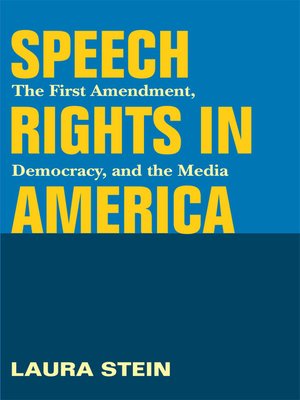Speech Rights in America
ebook ∣ The First Amendment, Democracy, and the Media · The History of Media and Communication
By Laura Stein

Sign up to save your library
With an OverDrive account, you can save your favorite libraries for at-a-glance information about availability. Find out more about OverDrive accounts.
Find this title in Libby, the library reading app by OverDrive.



Search for a digital library with this title
Title found at these libraries:
| Loading... |
The First Amendment is the principle guarantor of speech rights in the United States. But the Supreme Court's interpretations of it often privilege the interests of media owners over those of the broader citizenry.
Laura Stein argues that such rulings alienate citizens from their rights, corrupt the essential workings of democracy, and prevent the First Amendment from performing its critical role as a protector of free speech. Drawing on the best of the liberal democratic tradition, Stein demonstrates that there is a significant gap between First Amendment law and the speech rights necessary to democratic communication, and proposes an alternative set of principles to guide future judicial, legislative, and cultural policy on old and new media.
| Contents Acknowledgments 1. The First Amendment and Communication in Democratic Societies 2. Rethinking Speech Rights 3. Social Mediation in Print and Broadcast Media 4. The Right to Public Space 5. Democratic Speech Rights on the Internet 6. The Future of Democratic Communication Notes Bibliography Index |"This is a thoughtful analysis ranging over history and recent cases."—Communication Booknotes Quarterly"An important work, offering sophisticated yet engaging analyses of First Amendment law and the media landscape in which we find ourselves in the United States."—Matthew Bunker, Reese Phifer Professor of Journalism, University of Alabama
"A forceful and intellectually comprehensive argument that the First Amendment should be a positive, not simply a negative, guarantee that empowers and perhaps obliges government to protect the public ends of free expression. . . . Stein brings a breadth of perspectives and material to the subject that few, if any, have managed to do. Her book is an original and important contribution to our understanding of free expression in America."—Randall P. Bezanson, author of How Free Can the Press Be?
|Laura Stein is an assistant professor of communication at the University of Texas at Austin.






